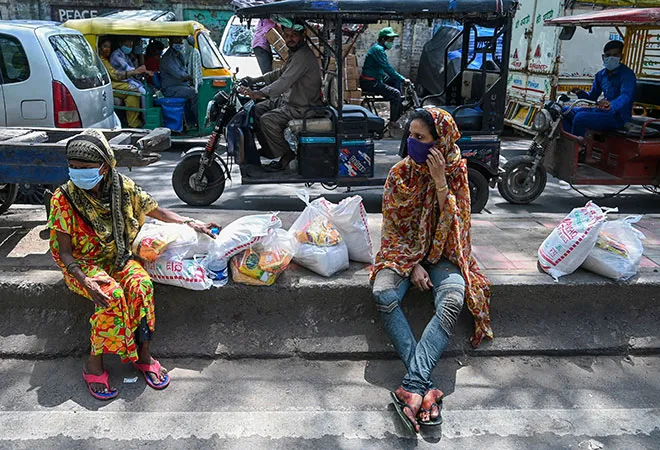
Food safety is a public health priority. According to the World Health Organisation (WHO), access to sufficient amounts of safe and nutritious food is key to sustain life and promote good health. Food safety strengthens sustainable development by supporting national economies, trade and tourism; and contributes to food and nutrition security. Unsafe food leads to 600 million (1 in 10) people falling ill and 420,000 deaths every year—a loss of 33 million healthy life years. It costs US $110 billion annually on medical expenses resulting from the consumption of unsafe food in low- and middle- income countries. Even though COVID-19 is not transmitted through food, it has had a crucial impact on food security and has heightened the focus on food-related safety issues. However, it has also exposed the vulnerabilities in the food system, impacting both production and supply, from farm to fork. ‘Safe food today for a healthy tomorrow’ is an apt theme for this year’s World Food Safety Day. It stresses on the long-term benefits of production and consumption of safe food for people, planet, and the economy.
COVID-19 has posed an unprecedented challenge to the food system causing food loss and food wastage (figure 1). With lockdowns and containment measures causing closure of restaurants, schools, hotels, and shopping places, the demand for food has faced a a slump. Stockpiling, shortage of supply, and price hikes has led to low demand and spoilage of food supply. Crop destruction, locust invasion, and plowing fresh vegetables have led to food loss during the pandemic.
With lockdowns and containment measures causing closure of restaurants, schools, hotels, and shopping places, the demand for food has faced a a slump. Stockpiling, shortage of supply, and price hikes has led to low demand and spoilage of food supply. Crop destruction, locust invasion, and plowing fresh vegetables have led to food loss during the pandemic
 Figure 1: COVID-19’s impact on food safety & security
Figure 1: COVID-19’s impact on food safety & security
Food waste is an issue of public concern and is critical to achieving target 12.3 of the Sustainable Development Goals—‘halving per capita global food waste at retail and consumer levels by 2030, as well as reducing food losses along the production and supply chains’. About one-third (1.3 billion tonnes) of food produced globally for human consumption gets wasted every year, enough to feed the 690 million who go hungry. Global food loss and waste has caused a carbon footprint of about 3.3 billion tons of CO2 per year. The pandemic-led disruption of supply chains from transport restrictions, labour shortage, and quarantine measures have led to significant increase in food loss and waste, especially perishables.
A consumer survey across the UK, US, and China shows 77 percent are concerned about food safety, with 52 percent feeling that it is a top three global issue. More than two-thirds of consumers felt that the pandemic crisis will impact the global supply chain and access to food. They expressed the need to focus on preventing and mitigating food safety.
The joint statement by the World Trade Organisation (WTO), Food and Agriculture Organisation (FAO), and the World Health Organisation to minimise the impact of COVID-19 calls for ‘enhancing food security, food safety, and nutrition and improving the general welfare of people around the world’. Nutrition and food safety guidance have been issued for food businesses, consumers, and food safety authorities to maintain good health. Even with a low risk of getting COVID-19 from fresh or packaged food, following good food safety practices for cleaning, handling, and storage helps reduce the risk.
A multi-country survey of food industries from 16 countries on food safety during the pandemic reveals staff awareness, hygiene, and protective gear as important aspects to follow. The retail supply chain was most affected by the pandemic as were food storage facilities. Even though the survey shows adherence to food safety, less than half the surveyed companies did not have any emergency plan in place. Another survey indicates lack of confidence around food safety and hygiene while eating out and shift to plant-based alternatives to address food safety gaps since the pandemic.
Food fraud and false food claims and labelling have been on the rise posing a challenge to food safety and supply chain resilience. A report indicates an increased consumption of unsafe foods during the pandemic with high levels of preservatives leading to health issues. However, COVID-19 has also brought in a paradigm shift for safe food practices and the importance of food safety and good hygiene practices for everyone including food industry and consumer. WHO’s ‘five keys to safer foods’ needs to be reinforced for all consumers and food handlers.
Food fraud and false food claims and labelling have been on the rise posing a challenge to food safety and supply chain resilience. A report indicates an increased consumption of unsafe foods during the pandemic with high levels of preservatives leading to health issues
This crisis brings an opputunity to change our food system in ways that are less susceptible to disruption. Consumers have become increasingly conscious of food safety and technologies that keep food safe. The recent advances in Artificial Intelligence (AI) technology and machine learning can be effective for efficient and safe food supply chains as well as food supply transparency and traceability.
The Pan American Health Organisation (PAHO) has launched a five-calls to action plan—ensure it’s safe; grow it safe; keep it safe; team up for food safety; and know what is safe to reiterate shared responsibility of governments, food producers, business operators, and consumers for ensuring food safety. Governments should look at ways to minimise disruptions in the food supply chain and ensuring safety of people where food is produced, processed, packaged, and sold.
The views expressed above belong to the author(s). ORF research and analyses now available on Telegram! Click here to access our curated content — blogs, longforms and interviews.





 PREV
PREV


